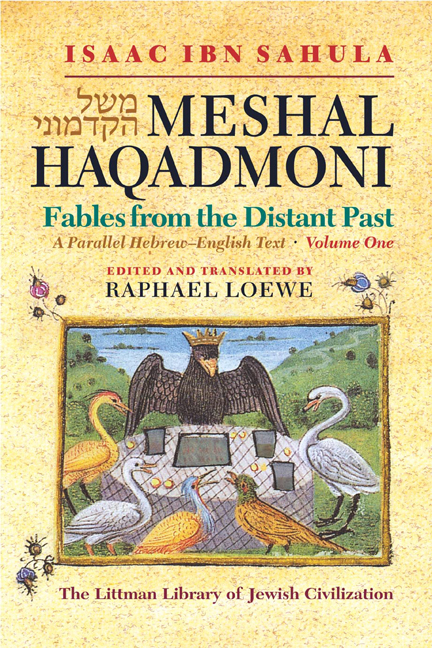Book contents
- Frontmatter
- Epigraph
- Publisher’s Note
- The Illustrations
- Preface
- Contents
- List of Abbreviations
- Introduction
- MESHAL HAQADMONI
- Part I On Wisdom
- Part II On Penitence
- Part III On Sound Counsel
- Part IV On Humility
- Part V On Reverence
- Appendices
- Bibliography
- Index of Citations
- Index of Key Hebrew Terms
- Index of Subjects
Introduction
- Frontmatter
- Epigraph
- Publisher’s Note
- The Illustrations
- Preface
- Contents
- List of Abbreviations
- Introduction
- MESHAL HAQADMONI
- Part I On Wisdom
- Part II On Penitence
- Part III On Sound Counsel
- Part IV On Humility
- Part V On Reverence
- Appendices
- Bibliography
- Index of Citations
- Index of Key Hebrew Terms
- Index of Subjects
Summary
THE LIFE OF ISAAC IBN SAHULA
Biographical information is scant in the extreme regarding Isaac Ibn Sahula, as we shall—for convenience—call him, his full name being Isaac ben (or ibn) Solomon ‘Abi Sahula. In his dedicatory poem he refers to himself as ‘both scion and sire of segullah’, and this has led to his surname being sometimes misrepresented in Hebrew reference books through failure to appreciate his play on words. Segullah means ‘particular treasure’, and in context he obviously had in mind Exodus 19: 5, where Israel is promised that obedience to God's commandments will constitute them his segullah. The name Sahula is in point of fact an Arabic one, being both common and in use amongst Jews in the forms Sahl, Sahlan, Ibn Sahl. The verbal stem sahula whence it is derived means, of a roadway, ‘to be soft on the feet, easy-going’, whence the adjective sahl, applied in a transferred sense (as in English) to equability of temperament. The abstract noun suhula (meaning approximately ‘affability’) is recorded, and the prefix ‘abi (literally ‘father of ‘, i.e. ‘characterised by’) suggests that the name ought properly to be vocalised Suhula rather than Sahula. One may presume that it was first applied, as a complimentary sobriquet, to a forebear, whose descendants maintained it as their patronymic.
In his second (and biographical) introduction, editorially presented by him as a preface to Part I, Ibn Sahula mentions the only two dates relative to his life and career that are known. When describing, in exaggerated and perhaps somewhat romanticised terms, his ‘call’ as a moralist, he states4 that he was in Egypt in the year 5041according to the Jewish calendar ‘from the creation’, i.e. 1281 CE, having already lived for ‘thirty-seven years as a subject of the evil impulse’. In other words, he was born in 1244 and there is no evidence which would render that date questionable. On the basis of the foregoing, scholars have assigned the composition of the Meshal haqadmoni to 1281ignoring the fact that this introduction, although describing the beginning of his vocation as a moralising fabulist, can hardly have been composed before the fables themselves were complete.
Information
- Type
- Chapter
- Information
- Meshal Haqadmoni: Fables from the Distant PastA Parallel Hebrew-English Text, pp. xv - cxxxiiPublisher: Liverpool University PressPrint publication year: 2004
